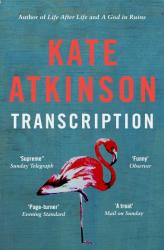In wartime, truth is so precious that she should always be attended by a bodyguard of lies.’
Winston Churchill
There are some writers who you’d like to read but just never seem to get around to. Until I’d read Transcription, in my case Kate Atkinson was one of those authors. For crime/mystery fans Kate Atkinson wrote the Jackson Brodie novels which were adapted for television as Case Histories with Jason Issacs in the lead role. Having enjoyed Case Histories, I’d planned to read the Jackson Brodie novels but just never did. Even with Transcription I’d picked it up a few times but put it down because there was something else which caught my eye. Happily, I did finally purchase Transcription and I’m certainly glad I did, I just may also get around to those Jackson Brodie novels as well.
Transcription begins in 1981 with Juliet Armstrong lying on a pavement having just been hit by a car after attending a Shostakovich concert in Wigmore Hall, London. She’s thinking of the rest of the Shostakovich series she’ll miss, her son in Italy, the impending royal wedding and, at 60 years of age, had her life been long enough or was it an “illusion, a dream that had happened to someone else”. From there Transcription takes us back to two important periods in Juliet’s life, 1950 when she’s working for the BBC in London and 1940 when she was recruited to work for MI5 during the Second World War, those periods are about to collide.
There are a number of aspects to Transcription which I enjoyed. The first of these is the strength of Juliet Armstrong as a character and first-person narrator. This style of novel is often difficult and although the narration does grate a little towards, especially in the 1950 sections of the book, there is always a gem of a thought which reminds you just how enjoyable this book is to read. Secondly, Kate Atkinson is a master at highlighting the mundane parts of life. The sheer boredom of Juliet transcribing secret meetings with German sympathisers, and yet almost getting to know them personally through their voices, is expertly captured. Also, there’s the unexpected sacrifices which war brings like being no longer able to get a good coffee because the Italian owner of her favourite café is now interned and the embarrassing task of going to the toilet in Wormword Scrubs, which MI5 used as a headquarters during WW2, because there’s no doors on the cubicles. Lastly, Transcription is also a very good thriller which carefully builds Juliet’s sense of doom that the things that she, and others, did during the war are now coming back to haunt her and she doesn’t know the price she’ll need to pay.
I started this review with a quote from Winston Churchill. It’s the epigraph at the beginning of Transcription and it perfectly encapsulates this beautiful book. Now, I must do something about those Jackson Brodie novels.
Transcription

In 1940, eighteen-year old Juliet Armstrong is reluctantly recruited into the world of espionage. Sent to an obscure department of MI5 tasked with monitoring the comings and goings of British Fascist sympathizers, she discovers the work to be by turns both tedious and terrifying. But after the war has ended, she presumes the events of those years have been relegated to the past for ever.
Ten years later, now a producer at the BBC, Juliet is unexpectedly confronted by figures from her past. A different war is being fought now, on a different battleground, but Juliet finds herself once more under threat. A bill of reckoning is due, and she finally begins to realize that there is no action without consequence.
Add comment